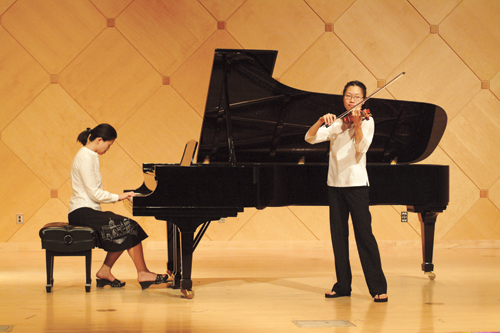
Although this telephone call occurred more than seven years ago, I can still remember it vividly.
“Hello, uh, Dr. Katzenmoyer?”
“This is he.”
“Hi, my uh, teacher gave me your phone number. I need someone to play the piano for the Hindemith horn sonata.”
My immediate thoughts were: I love the music of Hindemith! I can take a few weeks to study the score, listen to some recordings, and pencil in the right fingerings. I will do a formal analysis, study the phrase structure, and try to determine how the piece is constructed. Then I’ll set my metronome to a slow tempo and learn to play it the right way, increasing by a few clicks at a time. This will be terrific! I asked, “When is the performance?”
“Uh, next Thursday.”
I did not hang up on the young man – at least, not immediately – but I have had many good and bad experiences as an accompanist. Here are suggestions of how to treat accompanists so that they will be willing to come back to your classroom again and again.
Allow ample time for the accompanist to learn the music. Whether performing the Glazunov Saxophone Concerto, or “Variations on Three Blind Mice,” make sure to give accompanists the music long before the performance date. Even the best sightreaders appreciate having suitable time to study, prepare, and practice the music. For my story listed above, I expected at least three months, preferably six, to give me adequate time to prepare such a difficult piece of music. Teachers who provide minimal time for accompanists to learn to play the music may be left with a minimal list of accompanists to use.
Treat the accompanist as equal to the soloist. Ask accompanists questions about interpretation, expression, and phrasing during rehearsals. It is unnecessary to take every suggestion the accompanist provides, but keyboardists who are good listeners may provide valuable insight toward realizing composers’ intentions. I have learned from many excellent music teachers, but I have also learned a great amount from accompanists with whom I have worked. Depending on the student’s age, and the ability level of the accompanist, it may be beneficial to schedule a rehearsal at a time when you are not present. A talented accompanist can produce great results when working with a student.
Model appropriate behavior of how to treat an accompanist during a rehearsal. I have witnessed several rehearsals in which the soloist was reduced to tears. It is rare, but there are occasions where tyrannical music teachers berate their accompanists as well. Even if the criticism is warranted, it is advisable to temper such words. Moreover, it is far better to frame any comments in a positive manner. Many of our students will go on to teach other students, so be sure to model appropriate behavior when leading rehearsals with accompanists, lest your students become the types of teachers we do not want them to be.
Use rehearsal time efficiently. Do not plan rehearsal time with the accompanist the same way as a private lesson. There are few things more frustrating to an accompanist than wasting time in a studio while the teacher works with the soloist and the accompanist sits and waits. It is acceptable to address specific points with the soloist while the accompanist is present, but avoid spending the majority of the rehearsal time singling out the soloist while the accompanist sits idly by. If you feel the soloist needs additional instructional time, postpone scheduled rehearsals with the accompanist until you can spend an appropriate amount of time with both musicians, not just the soloist.
Teach students to acknowledge the accompanists after a performance. An accompaniment part is often as difficult to learn as the solo part. Many keyboard parts are conceived as equal to the solo parts they accompany, and on some occasions, the piano part has more musical importance than the solo part. I remember learning to play the accompaniment to Schubert’s “Erlkonig,” which has an exhausting right hand part. When the singer finished the performance, he failed to acknowledge my time and hard work. That performance was more than 20 years ago, and it was the last time I played for that singer. Had the singer simply motioned to me after the performance, my perception of the experience would have been completely changed, and I would have been happy to accompany him again.
Use genuine praise when appropriate. False praise is easy to recognize, and to a professional accompanist it can be perceived as condescending. Show that you appreciate accompanists’ work, but only if it is worthy of praise. If an accompanist is unprepared and struggles through a rehearsal, he will likely realize that more preparation is needed. It would be appropriate to ask him to stay for a few minutes after the soloist is dismissed to discuss some ideas. Your private comment to him could be, “I realize how difficult a piece this is to play, so I’ll look forward to hearing you at the next rehearsal after you’ve had some more time to practice the interlude at measure 64.” These comments show that you understand the accompanist’s plight, while at the same time offering clear directions.
Conversely, if the accompanist plays exceptionally well during a rehearsal, lauding their efforts is most appropriate. Every time I accompany a certain soloist from my church choir, he tells me, “Thanks for making me sound great!” and he always means it. He is an excellent singer, yet he appreciates how hard I work to help realize the composer’s intentions whenever we perform together. Something as simple as, “I can tell that you’ve spent a lot of time practicing the piece, and I sure do appreciate it!” will be well received by any keyboardist, and the accompanist will likely be willing to play for more of your students in the future.
Leave the door open for future work with the accompanist. If you find an outstanding accompanist, let him know how pleased you are with the performance, how much you’ve enjoyed working together, and that you would like to work together in the future. A successful business is one with repeat customers, so use this philosophy when working with accompanists. This attitude can be especially meaningful to an accompanist after a lackluster performance by the soloist. A mediocre soloist should not reflect poorly on the accompanist. If your soloist has not performed up to your expectations, the accompanist can probably sense this. A comment such as, “I realize the overall performance wasn’t what it could have been, but you played beautifully, and I look forward to having you accompany my students again sometime,” will encourage the keyboardist to work with you again.
Send a handwritten thank-you note. Some accompanists are professionals, and some are volunteers, but all deserve a thank-you note. An unexpected surprise in the mailbox a few days after a performance is meaningful to your accompanists. Just a sentence or two stating appreciation takes minimal time to write but can result in maximum benefit for future performances.






